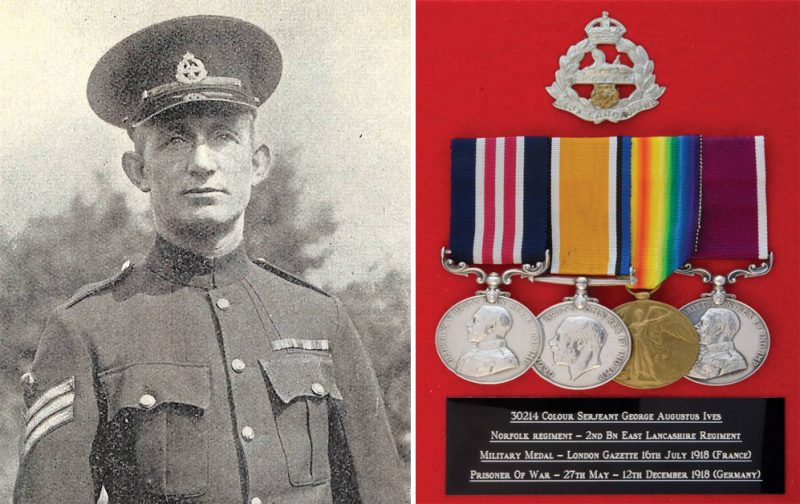Mandy McClean sat with her ear glued to the telephone listening to the bids as they slowly climbed. They passed her estimate of £700, passed her bid of £800, but she kept telling the auction helper on the other end of the line to keep going. Eventually, the set of four medals was hers, for the princely sum of £900 or £1,200 with auction fees.
So whose medals had Mandy purchased and what were they? Well, they belonged to her grandfather, George Augustus Ives, and the set included a British War Medal, the Military Medal, an Army Long Service Medal and a Good Conduct Medal.
George Ives was born in 1892 in Gorleston, Norfolk. He joined the armed services in 1910 with the 1st Battalion Norfolk Regiment before transferring in 1917 to the 2nd East Lancashire Regiment. He served in France during World War I and was decorated for bravery during intense fighting near Guyencourt.
Ives was awarded the Military Medal on the 16th July 1918 at age 26 for his bravery during the battle in which he was wounded several times before being taken prisoner. He spent six months as a prisoner before being repatriated to Britain at the end of the war.
After the war he served with British Forces all over the world and in 1929 was awarded a Long Service and Good Conduct Medal. In 1931 he was granted an honourable discharge from the Army and returned to live in Belfast in Northern Ireland.
Ives had married in 1916 in Belfast to his sweetheart, Sarah Newell Tedford, and he now lived quietly working for Harland & Wolff, a shipbuilding company, as a clerk. He died peacefully in 1973.
His family had no idea what had happened to his medals and how they had been sold out of the family’s keeping. The last time the family saw the medals was when they came up for auction in 2008 and despite Mandy McClean’s best efforts to track them down they seemed to be lost forever to someone else’s collection.
At the end of June, she quite providentially saw an advertisement in the Belfast Telegraph saying that four medals were to be auctioned by Morton & Eden Auctioneers in London. She registered as a telephone bidder and just kept bidding until her grandfather’s medals were safely back in her hands. Mandy was thrilled to get the medals back saying, “It’s good to get them back into the family again, especially for my mother.”
She still remembers her grandfather as an ‘inspiring gentleman,’ even though he died when she was fourteen. In an interview with The Belfast Telegraph, she said, “He was very typically ex-Army. He liked to go for walks, and he could tell you absolutely anything about nature. He was a very interesting man to be with. He told us about being in the trenches, and it was just like they described it, singing to each other to keep their spirits up. He told me a little bit about when he was a prisoner of war – you didn’t know if you were going to get out alive.”
Mandy’s sister Jackie Johnson was also inspired by this venerable gentleman, “I can just remember him, a very smart man, he was always well kept and had his shoes shined. The only story that stuck in my memory was when he went upstairs in the house in Hillfoot Street and brought down a silver thing. It was the bullet that was dug out of his ankle when he was injured.”
“He was a gentleman, one of the old breed.”
